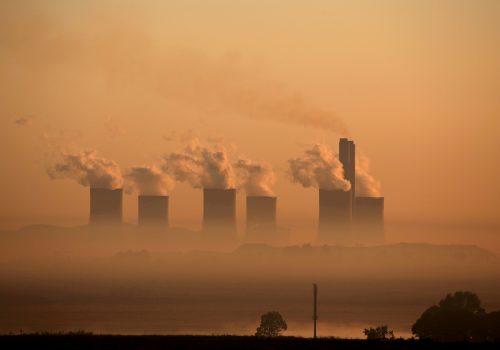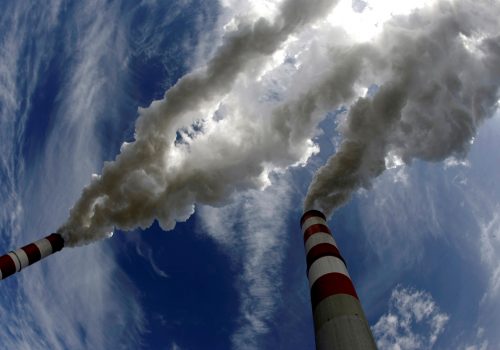FAST THINKING: Why climate change will wreak havoc on national security
GET UP TO SPEED
They’re not playing it cool. On Thursday, the White House, the Pentagon, the Department of Homeland Security, and the Office of the Director of National Intelligence released a damning series of assessments on climate change. All of them say it poses a serious global security threat—from stoking tensions in conflict zones to giving geopolitical adversaries a leg up. Just days before President Joe Biden’s trip to the United Nations Climate Change Conference (COP26) in Glasgow, Scotland, we took our experts’ temperature on what it all means.
TODAY’S EXPERT REACTION COURTESY OF
- Barry Pavel (@BarryPavel): Director of the Scowcroft Center for Strategy and Security and former US national-security official
- Sherri Goodman (@GoodmanSherri): Atlantic Council board director and former US deputy undersecretary of defense for environmental security
- Peter Engelke (@PeterEngelke1): Deputy director of foresight at the Scowcroft Center
Known unknowns
- Most everyone understands the environmental threat of rising temperatures. But digging into the first-ever National Intelligence Estimate (NIE) on climate, among the other Biden administration reports, reveals “what we all are thinking but have not yet acted upon effectively,” Barry says.
- The big takeaway: “The boiling threat to the habitability of the planet represents both a central threat in and of itself, but also will spawn a multitude of new security challenges while exacerbating existing ones,” Barry tells us.
- What do those security challenges look like? The “scariest” takeaway “from a threat perspective is that parts of the planet will be uninhabitable from either heat or sea-level rise in the coming decades,” Sherri reveals, “and that many highly vulnerable parts of the world are ill-equipped to prepare for or manage this risk.”
- It’s enough for the American public to start thinking about the threat posed by climate change in a similar way to how we’ve thought about terrorism for the past two decades, Sherri explains. “Climate change, like terrorism after 9/11, is not just about the ‘away game,’ but also about the ‘home game,’ in the US,” she says. “And yes, like terrorism, we can’t eradicate it in just one location. We must have a global strategy with allies and partners. It’s an ‘all hands on deck’ effort.”
- Peter opts for a different analogy for this “existential threat” to the United States: the Cold War, when “policy makers adopted a long-term mindset to design strategic whole-of-society responses to meet a generational challenge.”
Sweating the big stuff
- In the mid-2000s, Sherri coined the term “threat multiplier” to describe how climate change was exacerbating challenges in the Iraq and Afghanistan wars, and she helped convince the Pentagon to take the problem seriously.
- But as she reviewed the newest Department of Defense Climate Risk Analysis, Sherri came away “surprised” by “the deep planning for climate risk that had already begun,” such as extensive war-gaming.
- One aspect of the NIE that struck our experts was how it highlighted eleven countries and two regions (Central Africa and the Pacific islands) that are “of great concern” for climate impact. “On this list are India, a major power, and three Central American countries (Guatemala, Honduras, and Nicaragua) whose stability has a direct impact on migration to the United States,” Peter points out.
- Barry adds that the list of countries “is helpful for prioritizing national and international policies and actions. However, focusing only on those countries would be wildly insufficient.”
Progress report
- Sherri’s big surprise from the NIE was “the candid reality about how far we are from meeting our climate targets.” That’s why COP26, which begins on October 31, is seen as such a crucial moment for global policy makers—and Sherri hopes the NIE can “shake up the negotiators in a good way.”
- At home, these kinds of reports can be helpful stage-setters, but implementation is another story. Barry says the US government lacks everything from “strategic foresight” to “public-private partnerships” that can “effectively anticipate and seek to effectively mitigate these looming threats.”
Further reading
Thu, Oct 14, 2021
For Africa to go green, the private sector must step up. Could COP26 provide an answer?
AfricaSource By
The continent possesses an abundance of renewable-energy-production capabilities—but capitalizing on its potential remains a challenge.
Tue, Aug 31, 2021
Heat is killing us—and the economy too
COP26 By
Most people know the knock-on effects of global warming by now: rising sea levels, mass extinction of plants and wildlife, worsening floods, fires, and hurricanes. But heat itself is too often overlooked as a destructive force in its own right.
Mon, Aug 9, 2021
FAST THINKING: What the UN climate report didn’t say
Fast Thinking By
The report maps a path to avert planetary catastrophe if humans completely stop adding carbon dioxide to the atmosphere by 2050. But is that even possible?
Image: A young girl carries a sign reading "Game over" during climate protests in Berlin on October 22, 2021. Photo via Britta Pedersen/dpa and Reuters.


